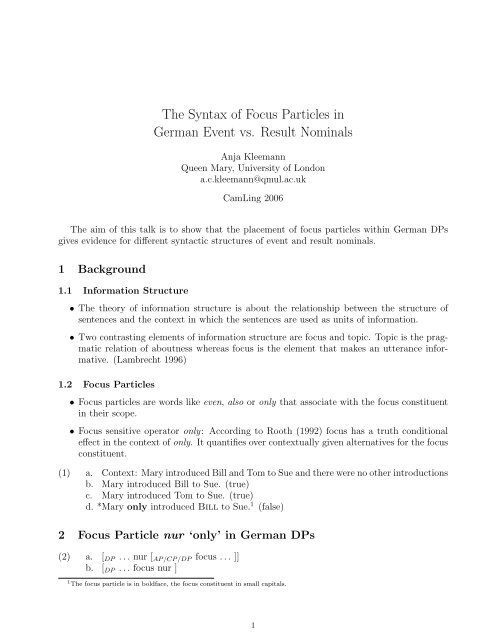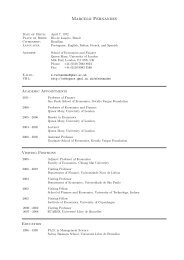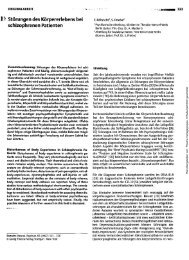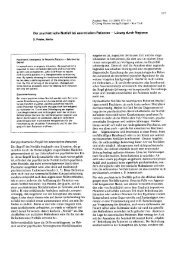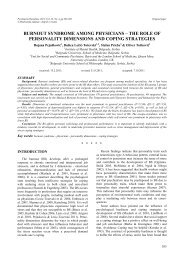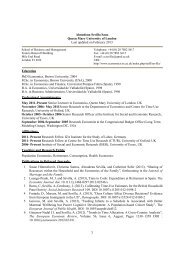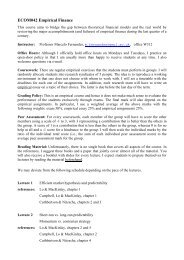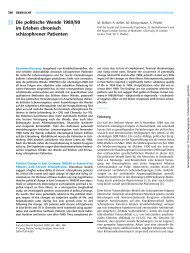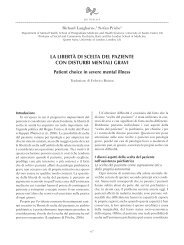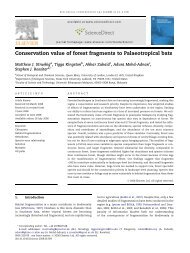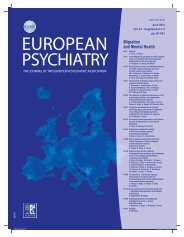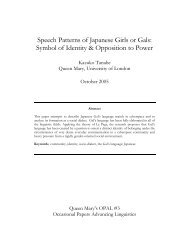handout - Personal Webspace for QMUL - Queen Mary, University of ...
handout - Personal Webspace for QMUL - Queen Mary, University of ...
handout - Personal Webspace for QMUL - Queen Mary, University of ...
Create successful ePaper yourself
Turn your PDF publications into a flip-book with our unique Google optimized e-Paper software.
The Syntax <strong>of</strong> Focus Particles in<br />
German Event vs. Result Nominals<br />
Anja Kleemann<br />
<strong>Queen</strong> <strong>Mary</strong>, <strong>University</strong> <strong>of</strong> London<br />
a.c.kleemann@qmul.ac.uk<br />
CamLing 2006<br />
The aim <strong>of</strong> this talk is to show that the placement <strong>of</strong> focus particles within German DPs<br />
gives evidence <strong>for</strong> different syntactic structures <strong>of</strong> event and result nominals.<br />
1 Background<br />
1.1 In<strong>for</strong>mation Structure<br />
• The theory <strong>of</strong> in<strong>for</strong>mation structure is about the relationship between the structure <strong>of</strong><br />
sentences and the context in which the sentences are used as units <strong>of</strong> in<strong>for</strong>mation.<br />
• Two contrasting elements <strong>of</strong> in<strong>for</strong>mation structure are focus and topic. Topic is the pragmatic<br />
relation <strong>of</strong> aboutness whereas focus is the element that makes an utterance in<strong>for</strong>mative.<br />
(Lambrecht 1996)<br />
1.2 Focus Particles<br />
• Focus particles are words like even, also or only that associate with the focus constituent<br />
in their scope.<br />
• Focus sensitive operator only: According to Rooth (1992) focus has a truth conditional<br />
effect in the context <strong>of</strong> only. It quantifies over contextually given alternatives <strong>for</strong> the focus<br />
constituent.<br />
(1) a. Context: <strong>Mary</strong> introduced Bill and Tom to Sue and there were no other introductions<br />
b. <strong>Mary</strong> introduced Bill to Sue. (true)<br />
c. <strong>Mary</strong> introduced Tom to Sue. (true)<br />
d. *<strong>Mary</strong> only introduced Bill to Sue. 1 (false)<br />
2 Focus Particle nur ‘only’ in German DPs<br />
(2) a. [DP . . . nur [AP /CP /DP focus . . . ]]<br />
b. [DP . . . focus nur ]<br />
1 The focus particle is in boldface, the focus constituent in small capitals.<br />
1
2.1 Previously unnoticed Data<br />
• Why is there a grammaticality contrast regarding the focus particle placement between<br />
deverbal event nominals and non-deverbal result nominals?<br />
(3) a. <strong>Mary</strong>s Absage nur de-s FR<br />
<strong>Mary</strong>-GEN cancellation only the-GEN<br />
ÜH-EN Termin-s ist nicht<br />
early-GEN appointment-GEN is<br />
möglich<br />
possible<br />
‘<strong>Mary</strong>’s cancellation <strong>of</strong> only the early appointment is not possible’<br />
not<br />
interpretation: In a scenario in which <strong>Mary</strong> has several appointments, <strong>of</strong> which one<br />
is an early appointment, she has to cancel all appointments once she has to cancel<br />
the early appointment. It’s not possible <strong>for</strong> <strong>Mary</strong> to cancel the early appointment<br />
only.<br />
b. *Das Programm nur de-s FR<br />
the agenda only the-GEN<br />
ÜH-EN Termin-s fehlt<br />
early-GEN appointment-GEN lacks<br />
intended ‘The agenda <strong>of</strong> only the early appointment is missing.’<br />
• The placement <strong>of</strong> nur ‘only’ between the head nominal and the postnominal DP is grammatical<br />
in (3-a) but ungrammatical in (3-b). How to account <strong>for</strong> the different behaviour<br />
<strong>of</strong> focus particles within event vs. result nominals?<br />
• Grimshaw (1990) suggests different lexical entries <strong>for</strong> deverbal event nominals (in her<br />
terms complex event nominals) and non-deverbal result nominals. In event but not result<br />
nominals a lexical process mapping between the underlying verb and its nominalization<br />
assigns to the latter some or all <strong>of</strong> the lexical-semantic properties <strong>of</strong> the root. Event<br />
nominals have a semantic Ev (roughly event) argument in their lexical entry that accounts<br />
<strong>for</strong> their verbal properties.<br />
• Fu, Roeper, and Borer (2001) argue <strong>for</strong> a syntactic analysis that is based on the assumption<br />
that event and result nominals have different syntactic structures. Deverbal event nominals<br />
(in their terms process nominals) but not non-deverbal result nominals contain part <strong>of</strong> the<br />
VP extended projection.<br />
2.2 The Ambiguity <strong>of</strong> Deverbal Nominals<br />
• Deverbal nominals are ambiguous in that they can have either event or result reading.<br />
As event nominals they denote an event; as result nominals they refer to an entity that<br />
is the result <strong>of</strong> an event. (Examples are Absperrung ‘closing <strong>of</strong>f vs. barrier’, Einstellung<br />
‘employment’ vs. ‘attitude’, Kündigung ‘dismissal’ vs. ‘letter someone gets who has been<br />
made redundant’)<br />
• Non-deverbal nominals can only have result reading. (Examples are Brücke ‘bridge’, Brief<br />
‘letter’, Buch ‘book’)<br />
2
(4) Absage<br />
(deverbal)<br />
✟ ✟✟✟✟<br />
❍<br />
❍<br />
❍<br />
❍<br />
event <strong>of</strong> letter <strong>of</strong><br />
cancellation <strong>of</strong> sth. cancellation<br />
nur arg.<br />
(5) Programm<br />
(non-deverbal)<br />
✟ ✟✟ ❍❍<br />
❍<br />
agenda ∅<br />
*nur compl.<br />
3 The Syntax <strong>of</strong> Focus Particles in DPs<br />
*nur compl.<br />
• There are two possible attachment sites <strong>for</strong> focus particles within DPs. 2<br />
(6) DP<br />
✟❍<br />
✟ ❍<br />
✟ ❍<br />
. . . XP<br />
✟ ✟✟✟<br />
❍❍<br />
❍<br />
❍<br />
nur XP<br />
✟ ✟✟ ❍❍<br />
❍<br />
focused DP . . .<br />
(7) DP<br />
✟ ✟✟ ❍<br />
❍<br />
nur focused DP<br />
3.1 Particle Theory by Büring and Hartmann (2001)<br />
Büring and Hartmann (2001) suggest an adverbial-only analysis according to which focus particles<br />
in German . . .<br />
• adjoin to non-arguments<br />
• adjoin to maximal projections<br />
• c-command the focus<br />
• are as close to the focus as possible<br />
2 The different attachment sites <strong>for</strong> focus particles are discussed in the literature under the adverbial vs. adnominal analysis, see<br />
e.g. Jacobs (1986), Jacobs (1983), Büring and Hartmann (2001) <strong>for</strong> an adverbial analysis.<br />
3
(8) focus node<br />
✟ ✟✟✟<br />
❍❍<br />
❍<br />
❍<br />
focus particle focus node<br />
✟ ❍<br />
focus . . .<br />
3.2 Focus Particles don’t adjoin to DPs<br />
(9) a. weil jeder nur <strong>Mary</strong> liebt<br />
as everyone only <strong>Mary</strong> loves<br />
‘as everyone loves only <strong>Mary</strong>.’<br />
b. weil <strong>Mary</strong>1 jeder nur t1 liebt<br />
as <strong>Mary</strong> everyone only t1 loves<br />
‘as everyone loves only <strong>Mary</strong>.’<br />
c. Nur <strong>Mary</strong>1 liebt jeder t1<br />
only <strong>Mary</strong> loves everyone<br />
‘Only <strong>Mary</strong> is loved by everyone.’ NOT: Everyone loves only <strong>Mary</strong>’<br />
(10) a. *[P P P nur DP ]<br />
b. *[NP N nur DP ]<br />
(11) a. Ich glaube, dass der Bruder (*nur) des Grafen zu Besuch kommt<br />
I think that the brother (*only) the-GEN count-GEN to visit comes<br />
intended: ‘I think that the brother <strong>of</strong> only the count comes <strong>for</strong> a visit’<br />
b. Ich glaube, dass der Bruder mit (*nur) Hans zu Besuch kommt<br />
I think that the brother with (*only) Hans to visit comes<br />
intended: ‘I think that the brother with only Hans comes <strong>for</strong> a visit’<br />
3.3 Particle Theory on DPs<br />
Büring and Hartmann (2001)’ Particle Theory predicts that focus particles within DPs attach<br />
directly to APs and non-argument CPs but not to DPs.<br />
(12) DP<br />
✟ ✟✟✟<br />
❍<br />
❍<br />
❍<br />
❍<br />
det<br />
✟ ✟✟✟<br />
❍<br />
❍<br />
❍<br />
❍<br />
nominal<br />
✟ ✟✟✟<br />
❍<br />
❍<br />
❍<br />
❍<br />
nur focus node<br />
only non-argument<br />
4<br />
focus<br />
argument DP/<br />
non-argument DP
4 The Syntax <strong>of</strong> Event Nominals<br />
4.1 Adverbs<br />
(13) a. His explanation <strong>of</strong> the accident thoroughly (did not help him).<br />
b. His detailed explanation <strong>of</strong> the accident thoroughly (did not help him).<br />
c. *His version <strong>of</strong> the accident thoroughly (did not help him).<br />
Fu, Roeper, and Borer (2001) observe inter alia that ...<br />
1. adverbs occur in event nominals but not in result nominals, (13-a) vs. (13-c)<br />
2. adverbs and adjectives co-occur in event nominals, (13-b)<br />
4.2 Fu, Roeper and Borer (2001)’s Analysis<br />
• Fu, Roeper, and Borer (2001)’s embedded VP hypothesis: Event nominals include a nominal<br />
projection dominating a VP projection. The verb is raised to a nominal marker over<br />
the subject, object, and adverb. The VP projection accounts <strong>for</strong> the verbal properties <strong>of</strong><br />
event nominals.<br />
(14) DP<br />
✟ ✟✟✟✟✟<br />
❍<br />
❍<br />
❍<br />
❍<br />
❍<br />
❍<br />
D<br />
The ✟ ✟✟✟✟✟✟<br />
❍<br />
❍<br />
❍<br />
❍<br />
❍<br />
❍<br />
N<br />
✟<br />
explanation<br />
✟✟✟✟<br />
❍<br />
❍<br />
❍<br />
❍<br />
❍<br />
PP<br />
VP<br />
<strong>of</strong> the accident<br />
✟ ✟✟ ❍❍<br />
❍<br />
Adv VP<br />
4.3 Focus Particles<br />
thoroughly<br />
Does Fu, Roeper, and Borer (2001)’s embedded VP hypothesis explain focus particle placement<br />
in event nominals?<br />
(15) a. weil <strong>Mary</strong> den frühen Termin nur absagt<br />
as <strong>Mary</strong> the-ACC early appointment only cancels<br />
‘as <strong>Mary</strong> cancels only the early appointment.’<br />
b. Die Absage des frühen Termins nur ist nicht möglich<br />
the cancellation the-GEN early appointment-GEN only is not possible<br />
‘The cancellation <strong>of</strong> only the early appointment is not possible.’<br />
• In clauses focus particles attach to VP (15-a)<br />
• Event nominals allow the focus particle to precede the argument (3-a) as well as to occur<br />
low down in the structure (15-b)<br />
• → Focus particles provide more evidence that event nominals contain a VP projection.<br />
5<br />
. . .
4.4 The Syntactic Structure <strong>of</strong> Event Nominals<br />
• The focus particle nur adjoins to VP within event nominals.<br />
• It moves into the specifier <strong>of</strong> FP <strong>for</strong> two reasons:<br />
1. Focus particles preferably precede the focus constituent. 3<br />
2. Event nominals allow either a focus particle or an adverb to be adjoined to the embedded<br />
VP (not both).<br />
(16) DP<br />
✟ ✟✟✟✟✟<br />
❍❍<br />
❍<br />
❍<br />
❍<br />
❍<br />
die<br />
the<br />
✟ ✟✟✟✟✟✟ ❍❍<br />
❍<br />
❍<br />
❍<br />
❍<br />
❍<br />
N<br />
FP<br />
Absage<br />
cancellation<br />
✟❍<br />
❍<br />
❍<br />
❍<br />
✟✟✟✟✟<br />
❍<br />
❍<br />
✟ ❍<br />
nur<br />
FP<br />
only<br />
✟ ✟✟✟✟✟✟<br />
❍<br />
❍<br />
❍<br />
❍<br />
❍<br />
❍<br />
DP<br />
VP<br />
des frühen Termins<br />
the early appointment<br />
✟ ✟✟ ❍<br />
❍<br />
❍<br />
Focus Particle VP<br />
. . .<br />
5 Combining the Theories<br />
To sum up, the combination <strong>of</strong> Büring and Hartmann (2001)’s predictions on the attachment<br />
sites <strong>of</strong> focus particles in German as well as the embedded VP hypothesis by Fu, Roeper, and<br />
Borer (2001) on the DP-internal VP projection accounts <strong>for</strong> the focus particle placement in<br />
event vs. result nominals.<br />
6 Conclusions<br />
1. Deverbal event nominals and non-deverbal result nominals have different syntactic structures.<br />
2. Focus particles are further evidence that event nominals contain a verbal projection.<br />
3. Büring and Hartmann (2001)’s Particle Theory accounts <strong>for</strong> focus particle placement<br />
within DPs.<br />
3 See Wagner and Jaeger (2003) on why German focus particles usually precede the focus constituents.<br />
6
References<br />
Büring, Daniel and Hartmann, Katharina. 2001. The syntax and semantics <strong>of</strong> focus-sensitive<br />
particles in german. Natural Language and Linguistic Theory 19:229–281.<br />
Fu, Jingqi, Roeper, Thomas, and Borer, Hagit. 2001. The vp within process nominals: Evidence<br />
from adverbs and the vp anaphor do-so. Natural Language and Linguistic Theory<br />
549–582.<br />
Grimshaw, Jane. 1990. Argument Structure. MIT Press.<br />
Jacobs, Joachim. 1983. Fokus und Skalen. Zur Syntax und Semantik der Gradpartikeln im<br />
Deutschen. Niemeyer Tuebingen.<br />
Jacobs, Joachim. 1986. The syntax <strong>of</strong> focus and adverbials. In W. Abraham and S. de Meij,<br />
eds., Topic, Focus, and Configurationality, 103–128, Benjamins, Amsterdam.<br />
Lambrecht, Knud. 1996. In<strong>for</strong>mation Structure and Sentence Form. Cambridge <strong>University</strong><br />
Press.<br />
Rooth, Mats. 1992. A theory <strong>of</strong> focus interpretation. Natural Language Semantics 1:75–116.<br />
Wagner, Michael and Jaeger, Florian. 2003. Association with focus and linear order in<br />
german. Semantics Archive .<br />
7


